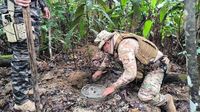A woman was arrested on Tuesday, May 6, 2025, in Carmópolis, Brazil, on charges of drug trafficking and maintaining ties with the Primeiro Comando da Capital (PCC), a notorious criminal organization. The arrest came after police executed a search warrant at her residence, where they discovered approximately 1 kilogram of cocaine base and a significant quantity of crack cocaine.
According to the Secretaria de Segurança Pública (SSP), the judicial order was issued following the seizure of drugs in her home. In a desperate attempt to dispose of evidence, the suspect reportedly threw packages of crack and cocaine out of her window. However, law enforcement officers conducted thorough searches in the vicinity and successfully located the drugs, still packaged for sale.
In addition to the narcotics, police also confiscated ammunition for a revolver and a notebook containing detailed records pertaining to the criminal organization. This notebook included client lists, financial transactions, and debt management notes, painting a picture of the sophisticated drug trafficking operations in the area.
The arrest was carried out by officers from the Delegacia Regional de Carmópolis. After being apprehended on the spot, the woman was taken into custody and is now awaiting proceedings in the judicial system.
Just a day later, on Wednesday, May 7, 2025, the Civil Police of São Paulo made another significant arrest, capturing one of the most wanted drug traffickers in northern Brazil. Paulo Roberto Estevam de Carvalho, also known as 'Paulo Baladeira', was taken into custody in the eastern zone of São Paulo, specifically in a beverage distribution business he owned on Rua Flor de Inverno.
Baladeira is recognized as the leader of cocaine trafficking operations along the triple border of Brazil, Peru, and Bolivia. He had been sentenced to 21 years in prison in 2014 for his involvement in drug trafficking, homicides, and being part of a criminal organization. Despite his incarceration, he allegedly continued to orchestrate violent criminal activities from afar, including authorizing the execution of rival gang members.
The arrest was made possible after the Civil Police of Acre alerted their São Paulo counterparts about Baladeira's possible location. Officers from the Departamento Estadual de Investigações contra o Crime Organizado (Deic) acted swiftly on this intelligence, leading to the apprehension of the fugitive.
This was not Baladeira's first encounter with law enforcement. He had previously been captured in 2023 in Brasiléia, a city on the border with Bolivia. During that arrest, he was rescued by an armed group that stormed the police station, stealing all the weapons from the facility. Following his re-arrest, even while under the surveillance of an electronic ankle bracelet, he managed to evade authorities and escape to São Paulo.
Law enforcement officials have noted that Baladeira's influence extended beyond borders, as he coordinated drug trafficking routes and criminal operations across Brazil and into Bolivia. His organization was particularly active in the border regions, especially in the cities of Epitaciolândia and Brasiléia in Acre, as well as in the Bolivian Department of Pando.
Roberth Alencar, a delegate with the Civil Police of Acre, emphasized the significance of Baladeira's capture, stating, "Baladeira was a priority target for the police due to his extensive criminal record and the ongoing influence he wielded even while outside of the state." His arrest marks a crucial step in combating the organized crime that has plagued these border regions.
As the investigations continue, authorities are focused on dismantling the networks that support drug trafficking and other criminal activities associated with the PCC. The recent arrests highlight the ongoing efforts of law enforcement to tackle organized crime in Brazil and maintain security in the affected areas.
With both arrests occurring within a day of each other, it underscores the persistent challenges faced by Brazilian authorities in their fight against drug trafficking and organized crime. As the police continue to pursue leads and gather intelligence, the hope is that these significant captures will disrupt the operations of the PCC and reduce drug-related violence in the region.





